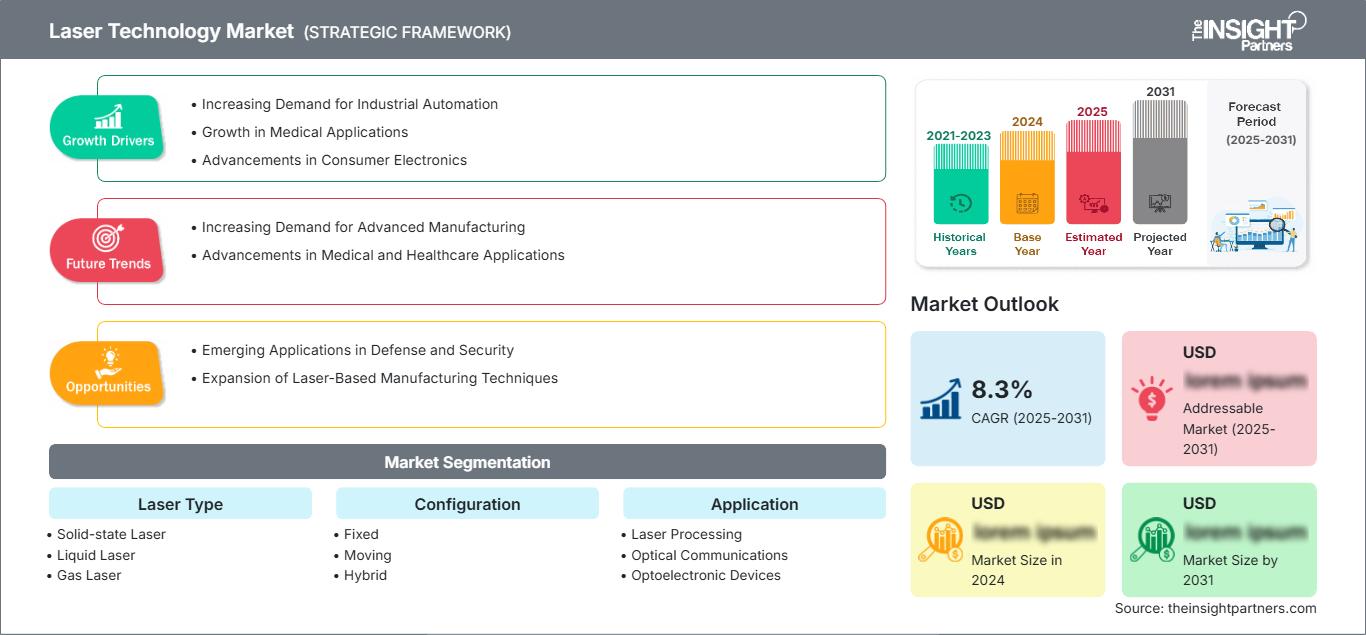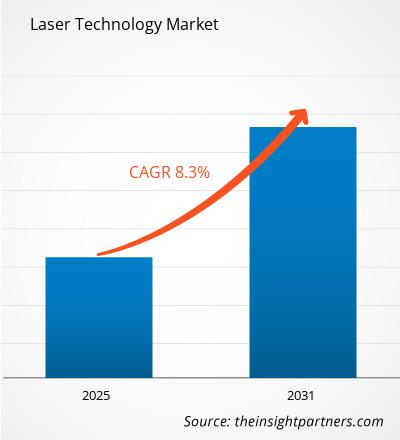Laser Technology Market Opportunities, Forecast, Size, and Analysis by 2031
Laser Technology Market Size and Forecast (2020 - 2030), Global and Regional Share, Trend, and Growth Opportunity Analysis Report Coverage: By Type (Solid-state Laser, CO2 Laser, Fiber Laser, Others); Application (Laser Processing, Optical Communications, Others); End User (Automotive, Industrial, Aerospace and Defense, Electronics and Semiconductor, Telecommunications, Medical, Others), and Geography (North America, Europe, Asia Pacific, and South and Central America)
Historic Data: 2021-2023 | Base Year: 2024 | Forecast Period: 2025-2031- Report Date : Mar 2026
- Report Code : TIPTE100000229
- Category : Electronics and Semiconductor
- Status : Upcoming
- Available Report Formats :


- No. of Pages : 150
The Laser Technology Market is expected to register a CAGR of 8.3% from 2025 to 2031, with a market size expanding from US$ XX million in 2024 to US$ XX Million by 2031.
The report is segmented by Laser Type (Solid-state Laser, Liquid Laser, Gas Laser, Others); Configuration (Fixed, Moving, Hybrid); Application (Laser Processing, Optical Communications, Optoelectronic Devices, Others); End User (Automotive, Aerospace and Defense, Electronics and Semiconductor, IT and Telecommunications, Healthcare, Others). The global analysis is further broken-down at regional level and major countries. The report offers the value in USD for the above analysis and segments
Purpose of the Report
The report Laser Technology Market by The Insight Partners aims to describe the present landscape and future growth, top driving factors, challenges, and opportunities. This will provide insights to various business stakeholders, such as:
- Technology Providers/Manufacturers: To understand the evolving market dynamics and know the potential growth opportunities, enabling them to make informed strategic decisions.
- Investors: To conduct a comprehensive trend analysis regarding the market growth rate, market financial projections, and opportunities that exist across the value chain.
- Regulatory bodies: To regulate policies and police activities in the market with the aim of minimizing abuse, preserving investor trust and confidence, and upholding the integrity and stability of the market.
Laser Technology Market Segmentation
Laser Type
- Solid-state Laser
- Liquid Laser
- Gas Laser
- Others
Configuration
- Fixed
- Moving
- Hybrid
Application
- Laser Processing
- Optical Communications
- Optoelectronic Devices
- Others
End User
- Automotive
- Aerospace and Defense
- Electronics and Semiconductor
- IT and Telecommunications
- Healthcare
- Others
Customize This Report To Suit Your Requirement
Get FREE CUSTOMIZATIONLaser Technology Market: Strategic Insights

-
Get Top Key Market Trends of this report.This FREE sample will include data analysis, ranging from market trends to estimates and forecasts.
Laser Technology Market Growth Drivers
- Increasing Demand for Industrial Automation: The laser technology market is driven by the rising demand for industrial automation across various sectors, including manufacturing, automotive, and electronics. Lasers are widely used for cutting, welding, marking, and engraving applications due to their precision and efficiency. As industries continue to adopt automation to enhance productivity and reduce operational costs, the reliance on laser technologies will grow. This trend is propelling the market forward, as companies seek advanced solutions to improve manufacturing processes and deliver high-quality products.
- Growth in Medical Applications: The expansion of laser technologies in the medical field significantly drives the market. Lasers are utilized in various medical applications, including surgical procedures, dermatology, and ophthalmology. Their ability to provide minimally invasive treatment options with reduced recovery times enhances patient outcomes. As healthcare providers increasingly adopt laser-based treatments for their effectiveness and precision, the demand for advanced laser systems continues to rise. This growth in medical applications presents a substantial opportunity for laser technology manufacturers to innovate and expand their product offerings.
- Advancements in Consumer Electronics: The rapid advancements in consumer electronics are another key driver for the laser technology market. Lasers are integral to various consumer products, such as optical disc drives, laser printers, and barcode scanners. The increasing demand for high-quality imaging and printing, along with the growth of smart devices, drives the need for advanced laser technologies. As manufacturers continue to innovate and integrate laser systems into new products, the market for laser technologies is expected to expand, catering to the evolving needs of consumers.
Laser Technology Market Future Trends
- Increasing Demand for Advanced Manufacturing: The growing adoption of laser technology in various manufacturing industries, such as automotive, aerospace, and electronics, is a major driver for the laser technology market. Manufacturers are increasingly utilizing laser-based processes, including cutting, welding, and additive manufacturing, to improve efficiency, precision, and productivity in their operations. The ability of laser technology to deliver high-quality, customized, and cost-effective manufacturing solutions is fueling its widespread adoption across diverse industrial sectors.
- Advancements in Medical and Healthcare Applications: The advancements in medical and healthcare applications of laser technology are another significant driver for the market. Lasers are increasingly being used in various medical procedures, including ophthalmology, dermatology, and surgical interventions. The advantages of laser-based treatments, such as improved precision, reduced invasiveness, and faster recovery times, are driving the adoption of laser technology in the healthcare industry.
Laser Technology Market Opportunities
- Emerging Applications in Defense and Security: The laser technology market presents significant opportunities in defense and security applications. Lasers are being increasingly utilized for applications such as target designation, range finding, and directed energy weapons. As governments and defense organizations invest in advanced technologies for enhancing national security, the demand for laser systems is expected to grow. Companies that specialize in developing laser technologies for defense applications can capitalize on this trend, offering innovative solutions that meet the unique requirements of the military and security sectors.
- Expansion of Laser-Based Manufacturing Techniques: The expansion of laser-based manufacturing techniques offers considerable opportunities for the laser technology market. Technologies such as additive manufacturing (3D printing) and laser sintering are gaining traction in various industries, including aerospace, automotive, and healthcare. These techniques enable the production of complex geometries and customized components with high precision and efficiency. As more industries explore the benefits of laser-based manufacturing, the demand for advanced laser systems and solutions will continue to rise, providing manufacturers with opportunities for growth and innovation.
Laser Technology Market Regional Insights
The regional trends and factors influencing the Laser Technology Market throughout the forecast period have been thoroughly explained by the analysts at The Insight Partners. This section also discusses Laser Technology Market segments and geography across North America, Europe, Asia Pacific, Middle East and Africa, and South and Central America.
Laser Technology Market Report Scope
| Report Attribute | Details |
|---|---|
| Market size in 2024 | US$ XX million |
| Market Size by 2031 | US$ XX Million |
| Global CAGR (2025 - 2031) | 8.3% |
| Historical Data | 2021-2023 |
| Forecast period | 2025-2031 |
| Segments Covered |
By Laser Type
|
| Regions and Countries Covered |
North America
|
| Market leaders and key company profiles |
|
Laser Technology Market Players Density: Understanding Its Impact on Business Dynamics
The Laser Technology Market is growing rapidly, driven by increasing end-user demand due to factors such as evolving consumer preferences, technological advancements, and greater awareness of the product's benefits. As demand rises, businesses are expanding their offerings, innovating to meet consumer needs, and capitalizing on emerging trends, which further fuels market growth.

- Get the Laser Technology Market top key players overview
Key Selling Points
- Comprehensive Coverage: The report comprehensively covers the analysis of products, services, types, and end users of the Laser Technology Market, providing a holistic landscape.
- Expert Analysis: The report is compiled based on the in-depth understanding of industry experts and analysts.
- Up-to-date Information: The report assures business relevance due to its coverage of recent information and data trends.
- Customization Options: This report can be customized to cater to specific client requirements and suit the business strategies aptly.
The research report on the Laser Technology Market can, therefore, help spearhead the trail of decoding and understanding the industry scenario and growth prospects. Although there can be a few valid concerns, the overall benefits of this report tend to outweigh the disadvantages.
Frequently Asked Questions
Naveen is an experienced market research and consulting professional with over 9 years of expertise across custom, syndicated, and consulting projects. Currently serving as Associate Vice President, he has successfully managed stakeholders across the project value chain and has authored over 100 research reports and 30+ consulting assignments. His work spans across industrial and government projects, contributing significantly to client success and data-driven decision-making.
Naveen holds an Engineering degree in Electronics & Communication from VTU, Karnataka, and an MBA in Marketing & Operations from Manipal University. He has been an active IEEE member for 9 years, participating in conferences, technical symposiums, and volunteering at both section and regional levels. Prior to his current role, he worked as an Associate Strategic Consultant at IndustryARC and as an Industrial Server Consultant at Hewlett Packard (HP Global).
- Historical Analysis (2 Years), Base Year, Forecast (7 Years) with CAGR
- PEST and SWOT Analysis
- Market Size Value / Volume - Global, Regional, Country
- Industry and Competitive Landscape
- Excel Dataset
Recent Reports
Related Reports
Testimonials
The Insight Partners' SCADA System Market report is comprehensive, with valuable insights on current trends and future forecasts. The team was highly professional, responsive, and supportive throughout. We are very satisfied and highly recommend their services.
RAN KEDEM Partner, Reali Technologies LTDsI requested a report on a very specific software market and the team produced the report in a few days. The information was very relevant and well presented. I then requested some changes and additions to the report. The team was again very responsive and I got the final report in less than a week.
JEAN-HERVE JENN Chairman, Future AnalyticaWe worked with The Insight Partners for an important market study and forecast. They gave us clear insights into opportunities and risks, which helped shape our plans. Their research was easy to use and based on solid data. It helped us make smart, confident decisions. We highly recommend them.
PIYUSH NAGPAL Sr. Vice President, High Beam GlobalThe Insight Partners delivered insightful, well-structured market research with strong domain expertise. Their team was professional and responsive throughout. The user-friendly website made accessing industry reports seamless. We highly recommend them for reliable, high-quality research services
YUKIHIKO ADACHI CEO, Deep Blue, LLC.This is the first time I have purchased a market report from The Insight Partners.While I was unsure at first, I visited their web site and felt more comfortable to take the risk and purchase a market report.I am completely satisfied with the quality of the report and customer service. I had several questions and comments with the initial report, but after a couple of dialogs over email with their analyst I believe I have a report that I can use as input to our strategic planning process.Thank you so much for taking the extra time and making this a positive experience.I will definitely recommend your service to others and you will be my first call when we need further market data.
JOHN SUZUKI President and Chief Executive Officer, Board Director, BK TechnologiesI wish to appreciate your support and the professionalism you displayed in the course of attending to my request for information regarding to infectious disease IVD market in Nigeria. I appreciate your patience, your guidance, and the fact that you were willing to offer a discount, which eventually made it possible for us to close a deal. I look forward to engaging The Insight Partners in the future, all thanks to the impression you have created in me as a result of this first encounter.
DR CHIJIOKE ONYIA MANAGING DIRECTOR, PineCrest Healthcare Ltd.Reason to Buy
- Informed Decision-Making
- Understanding Market Dynamics
- Competitive Analysis
- Identifying Emerging Markets
- Customer Insights
- Market Forecasts
- Risk Mitigation
- Boosting Operational Efficiency
- Strategic Planning
- Investment Justification
- Tracking Industry Innovations
- Aligning with Regulatory Trends




















 Get Free Sample For
Get Free Sample For